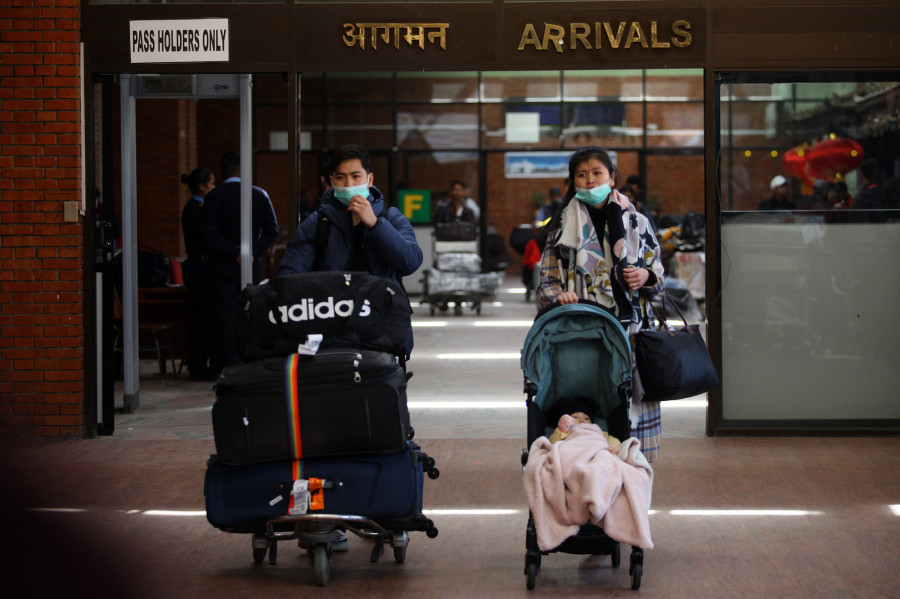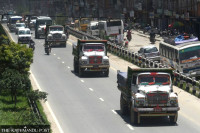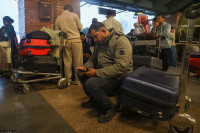National
Tourism Ministry cancels Visit Nepal promotions for March but experts say it is too little, too late
As travel entrepreneurs say the coronavirus outbreak has all but doomed Visit Nepal 2020, the prime minister instructs to call it off.
Sangam Prasain
Unwilling to abandon its Visit Nepal 2020 campaign, Nepal is among the few countries that have not restricted air travel to and from China in the wake of the Covid-19 outbreak, despite the fact that demands for air services have hit rock bottom since February.
But on Saturday, Bhattarai appeared to realise the risk of the Covid-19 outbreak.
“The world is gripped with fear, including powerful countries like the US. Nepal is also affected,” he said, addressing a programme in Boudha on Saturday. “We have decided to cancel major promotional activities in the overseas markets for the time being.”
An emergency meeting was held at the Tourism Ministry on Sunday, which issued a slew of directives to control the spread of the virus. One of its decisions was to cancel promotional events in the overseas markets for the month of March.
While public health and tourism entrepreneurs have welcomed the decision, however belated, to put the brakes on the Visit Nepal 2020 campaign, cancelling promotional events only for March is foolish, said one travel trade entrepreneur who spoke on condition of anonymity.
“The whole Visit Nepal 2020 campaign is meaningless at the time of global crisis,” he said. “It would be wiser to postpone the entire event.”
Sunday’s Tourism Ministry meeting also directed the Civil Aviation Authority of Nepal to submit a report within two days on whether Nepal should restrict flights to and from China based on the strategies of other countries. The outbreak of the coronavirus had prompted thousands of airlines globally to restrict travel into China by the first week of February.
Even China has locked down areas with tens of millions of people in an attempt to stamp out the epidemic. It has also issued a travel advisory to its citizens to restrict unnecessary trips in order to contain the spread of the virus.
“The campaign objective of drawing 800,000 additional tourists without adequate promotional activities was not convincing by itself,” said tourism entrepreneur Yogendra Sakya, who led the Nepal Tourism Year 2011 campaign. “During this crisis, it’s better to stop all overseas promotional expenses immediately.”
Nepal’s tourism year campaign for 2020 seems bound for failure, say entrepreneurs. Even early signs were not positive, as the campaign organisers made numerous gaffes. That the position for chief of the Nepal Tourism Board remained empty for much of January, even after the campaign was launched with much fanfare, should have been a dead giveaway. But things started going downhill much earlier.
The website for Visit Nepal 2020 did not have any promotional content until at least mid-September, for instance. But it seems the coronavirus epidemic has put the final nail on the coffin of Visit Nepal.
Bhattarai’s attempts to keep the campaign going, despite numerous public calls to limit or cancel the promotion, were met with derision and even anger. When he declared Nepal as a “coronavirus free zone”, he became an object of ridicule.
“That was not a promotion; it was arrogance at a time when the entire world is struggling to contain the virus,” said Sakya. “That was definitely not a wise statement from the government.”
The Tourism Ministry’s cancellation of promotions for March came a day after the organisers of the ITB travel trade fair in Berlin, billed as the world's biggest, cancelled the event in the German capital over coronavirus fears. The fair brings together more than 10,000 exhibitors from over 180 countries and was due to open on Wednesday.
“Globally no one is on a promotional spree of their countries due to the fear of the virus,” said Navin Trital, senior vice president of the Trekking Agencies Association of Nepal. “It would be another gaffe if Nepali officials travelled around the world promoting Visit Nepal.”
A large team of government officials is all set to fly to Tokyo for the inaugural Nepal Airlines flight on Monday. Japan is one of the countries worst hit by the virus. The Japanese government has only just begun to take more aggressive action, most notably by moving to close schools for a month.
The United States’ Centres for Disease Control and Prevention has advised against all non-essential travel to South Korea, China, Italy and Iran. And the agency has warned older and at-risk travellers to avoid Japan.
Fearing criticism, the Tourism Ministry issued a statement on Sunday that both countries—Japan and Nepal—will not be organising a formal programme.
Trital said that it was a waste of money and time for the government and tourism entrepreneurs to push for activities at a time of global crisis.
“Even once the virus is controlled, the repercussions would be significant, as a global economic crisis may prevail,” said Trital. “A job crisis would directly affect travel plans.”
Nepal is already suffering from the consequences of the coronavirus outbreak as hotel occupancy rates in Kathmandu, Pokhara and Chitwan have fallen by 70-80 percent, according to hoteliers.
Tourism experts say that it is necessary for Nepal to prepare for an outbreak in Nepal, in addition to restricting promotional activities.
“We should strengthen our preparedness to stop the spread of the virus first and then develop a strategy to heal during the crisis post-coronavirus, said Deepak Raj Joshi, former CEO of the Nepal Tourism Board.
Trital too said that the government needs to change gears and prepare a recovery plan.
“We should be prepared because arrivals to Nepal from the largest source markets like China, the US and the European market will definitely dry up for months. No one knows how long it will continue,” said Trital.
The Visit Nepal 2020 campaign budget would now be better invested in tourism infrastructure and internal promotion, he said.
Given Nepal’s fragile public health system and the lack of adequate response from the Nepal government, the World Health Organization has put Nepal at “very high” risk of a Covid-19 outbreak. The government is now scrambling to step up measures to contain a possible outbreak.
"For the safety of our people, we must screen all international air passengers," Dr Bikas Devkota, spokesperson for the Health Ministry, told the Post in a recent interview. "We are working to send additional staff at the airport health desk and equip more thermal cameras and laser thermometers at the airport."
Devkota said that health experts have also suggested flight restrictions from virus-hit countries and cities.
“But it is up to the government to decide,” he told the Post.
Even government officials are bemoaning the lack of a response from the government, especially travel restrictions, which can be crucial in preventing the entry of the virus into the country.
“Why, when so much is at stake for Nepal, is no one bothered to restrict flights from China?” questioned one senior bureaucrat at the Tourism Ministry. “Flights are neither bringing tourists nor money, but the virus is certain to arrive if we are lenient towards the neighbour.”
Meanwhile, the government on Sunday decided to stop issuing visas on arrival to foreign nationals starting March 7.
At Sunday's Cabinet meeting, Prime Minister Oli instructed the Tourism Ministry to call off Visit Nepal 2020 in view of the virus outbreak and lack of preparation, a minister told the Post. "The concerned ministry will formally take up the issue and most probably postpone the campaign for two years to make it Visit Nepal 2022," said the minister.
The first, and so far only, infection in Nepal was confirmed on January 24.
Since first detected in Wuhan, the capital city of Hubei Province of China, the coronavirus disease has sickened more than 87,500 people across the world. As of Sunday morning, at least 2,987 people have died, all but 117 in mainland China. The virus has so far spread to 50 countries.




 22.3°C Kathmandu
22.3°C Kathmandu















